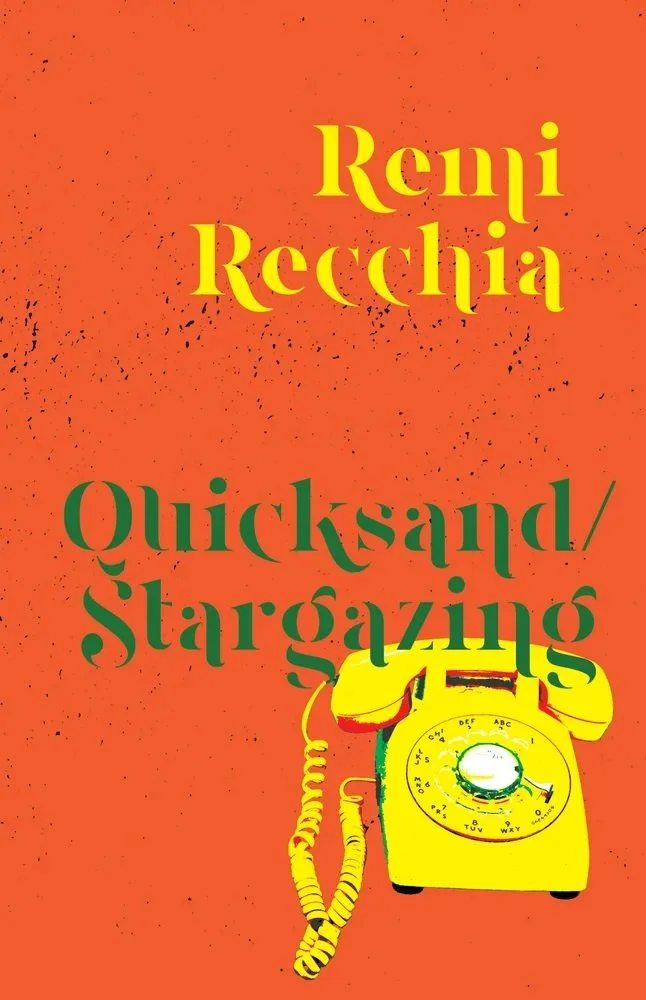Quicksand/Stargazing by Remi Recchia
Reviewed by Kristin LaFollette
At its core, Remi Recchia’s Quicksand/Stargazing is about connection and transformation. While the poems in the collection often focus on subjects like trauma and the complex process of becoming oneself, they are undergirded by an overwhelming sense of tenderness. Really, the poems act as love letters and tributes to a beautiful romantic partnership through mentions of an accepted proposal, a passionate marriage, the desire for children, and imagining a long-awaited son. Even when discussing difficult subjects—surgery and medical intervention, complicated family dynamics, seeking acceptance—the poems return to two people intricately bound by love and comfort. This connectedness is woven throughout the book in lines like,
caressing my wife’s face
as she worries the kitchen clean.
--
I think I might not know
how to die without my wife nearby.
--
I adore you through bed-
sheets, through dinner, through trinkets
snatched like a magpie,
The poems seamlessly move from one shared intimacy to the next, and while there are many quiet, delicate moments in the collection, there is also a fierceness: a desire for the speaker to protect a precious, sacred relationship, to keep it safe from anything that might threaten it.
The poems in this collection are also a tribute to the body and to one’s embodied experiences. There are literal metamorphoses taking place as the speaker undergoes a female to male transition and works toward a life of sobriety. Readers experience the speaker’s dysphoria and transition through discussions of “needles, / vials, expired prescriptions,” public restrooms, binders, missing breasts, fading scars. In “Waking Up from Top Surgery in a Sparse Airbnb Living Room,” Recchia writes,
The hardwood floor
reflects my new watch, large
face swallowing wrist:
a reminder that I am a man.
My body now a map instead of a globe,
rivered with lines and incisions.
Heavy bandages and compression
protect my newfound flatness.
Following top surgery, the speaker experiences reminders of his identity, a recognition of the ways his body maps a transformation. This “newfound flatness” is actually a broadening and an opening up where the speaker can “rise / like a Lazarus in the heat of certainty” as if just-born, as if finally sure of who he is and who he can be. In the same way the speaker has discovered this “newfound flatness,” he has also uncovered the calmness of sobriety. In one poem, Recchia writes, “sober and still” as the speaker recalls a moment in bed with his wife. In another, he writes, “We’ll paint the sky-canvas / splotchy cow colors / accented with sober love.” Finally, he writes, “We would all / be silent & sober & still.” When juxtaposed with “Ghazal for a Business Trip” where words and phrases like “hungover,” “eyes / bloodshot,” and “reeks of vomit” are at the forefront, the move toward sobriety is an act of quieting, an act of love toward oneself.
Quicksand/Stargazing is a timely collection of poems that at once reminds us of the fear, loss, and grief associated with the COVID-19 pandemic while also conveying hope through relationships and the human experience—the beauty of togetherness, of tending to ourselves and to others, of accepting and loving the complexities of our identities. Recchia’s poems show us that our “scars are not / battle wounds, they’re the map to the fight in the shadow of the / valley of death that [we’ve] already won.”
Remi Recchia is a trans poet and essayist from Kalamazoo, Michigan. He is a Ph.D. student in English-Creative Writing at Oklahoma State University. He currently serves as an associate editor for Cimarron Review. A three-time Pushcart Prize nominee, Remi’s work has appeared in Columbia Online Journal, Harpur Palate, and Juked, among others. He holds an M.F.A. in poetry from Bowling Green State University.
Kristin LaFollette
Kristin LaFollette is a writer, artist, and photographer and serves as the Art Editor at Mud Season Review. She is the author of Hematology (winner of the 2021 Harbor Editions Laureate Prize) and Body Parts (winner of the 2017 GFT Press Chapbook Contest). She received her Ph.D. from Bowling Green State University and is a professor at the University of Southern Indiana. Learn more about her work at kristinlafollette.com.



